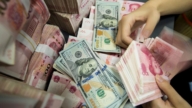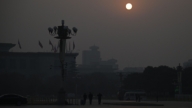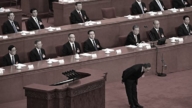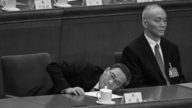【新唐人2012年6月28日訊】學者:中共政權失去合法性
7月1號,中共成立紀念日將到來,質疑中共政權的合法性的話題,再次升溫,除了中國大陸各地和香港民眾的維權抗議浪潮外,海外學者也從理論上分析指出,中國的維穩經費高於軍費充分說明,中共政權即便在自己的法律基礎上也失去了合法性。
據《自由亞洲電臺》報導,任教於「德國北威州行政管理學院」「警察與刑事學研究院」的政治學博士彭濤表示,如果一個國家的維穩經費高於軍費,這就說明這個國家的合法性是有疑問的,因為它不是建立在法律基礎上,而是暴力基礎上。
彭濤分析說,一個政權和統治權的合法性主要取決於三點,一個是,人民是否認可和順從這個政權。第二個是,如果認可,又必須有多數人認可。第三個就是當人民承認了這個權力的時候,這個權力才能夠獲得穩定,才能夠繼續下去。
彭濤說,中共政權來源的合法性不是現在才存在的問題,而今年受到空前質疑,是因為王立軍和薄熙來事件的發生,暴露了中共內部的腐敗,暴露了它反人民、反法理的黑暗一面。另一方面,大陸的老百姓也已經到處公開反抗了。
《南早》前記者指總編對其政治審查
香港英文報紙《南華早報》,6月初只以簡訊方式報導「六四受害者李旺陽事件」,被外界指責是自我審查之後,6月27號,報社不再續約的外籍記者再次指出, 《南華早報》總編王向偉對他進行政治審查。
最近幾天,多家海外媒體先後報導了《南華早報》屢獲人權新聞獎的外籍駐華記者慕亦仁(Paul Mooney)不獲續約事件,並引述慕亦仁的話說,他的不被續約是因為報導題材敏感。
據《BBC中文網》報導,慕亦仁說,從去年9月收到不續約通知為止,他總共發稿20多篇,但是只被採用了有關成都大熊貓的故事,如採訪人在紐約的中國維權律師高智晟的妻子耿和、中國維權律師受到壓力的報導,不是被拒絕刊登或者就是縮減內容之後挪到內頁。
慕亦仁還說,報社過去經常有外籍編輯在新聞取材上與王向偉發生爭執,他自己提出的採訪或者報導計劃也多次沒有被通過。
慕亦仁表示,他不能接受《南華早報》不與他繼續合約的說法是由於預算的問題,因為在他未獲續約之後,《南華早報》在北京找了幾名新的記者。
慕亦仁從23年前開始報導和中國有關的公共事件,並且較為關注中國內地和人權相關的議題,多次獲得新聞獎。而今年2月被任命為《南華早報》總編的王向偉,曾任職中共官方媒體《中國日報》,目前王向偉還是吉林省政協委員。
編輯/周玉林
Scholar: The Chinese Communist Regime Has Lost Legitimacy
Shortly before Chinese Communist Party’s (CCP)
anniversary on July 1st, the discussion about its legitimacy is getting more attention.
Mass protests have arisen both in mainland China
and Hong Kong.
The CCP’s budget for “maintaining stability” is even
higher than the military budget, according to analysis by overseas scholars.
This indicates that the CCP has lost
the legal basis for its power.
According to Radio Free Asia, Dr. Tao Peng from North
Rhine-Westphalia, Germany, has discussed that
when the budget spent on maintaining the regime’s power
is more than that spent on its military forces,
the regime’s legitimacy is questionable, as it is not established
on the basis of law, but on the grounds of violence.
Dr. Peng said that the legitimacy of a regime lies
in three aspects.
The first is whether the people accept and comply with it;
secondly, it must be accepted by the majority of people.
Finally, only when the people acknowledge this
authority can it be able to gain and maintain stability.
Peng said that not only is the legitimacy of the CCP a
current issue, it also drew unprecedented attention this year;
particularly after Bo Xilai and Wang Lijun’s cases
exposed the corruption of CCP and its dark side that opposes the people and the law.
Besides that, the people of mainland China
are protesting everywhere.
Hong Kong Journalist Denounces Alleged Censorship
The scandal of the Hong Kong newspaper, South China
Morning Post (SCMP) censoring of its coverage of Li
Wangyang’s suspicious “suicide” in June went further,
as its former journalist said that the chief editor had imposed political censorship on him.
In addition, recently, Paul Mooney, award-winning
journalist from SCMP, hit the headlines of many overseas media.
Paul said that he didn’t get his contract renewed
because he reported on sensitive issues.
According to BBC Chinese, Paul said he got the Notice
of Non-renewal last September. He did over 20 Reports,
but usually only the stories on the giant Pandas in China’s
Chengdu city were published.
Meanwhile, the reports on China’s suppression of
Human Rights lawyers, or an interview with Gao Zhisheng’s wife,
for example, were either rejected, reduced or moved
to less noticed spots.
He also said that his foreign journalist co-workers often
had a hard time with the chief editor regarding contents of the coverage,
and his news plans failed to be adopted many times.
Paul said that he finds it unacceptable that SCMP claims
that the reason for the non-renewal was due to an insufficient budget,
because SCMP hired several new journalists
from Beijing shortly after his non-renewal.
Paul started to report on China’s public issues
23 years ago.
He focused on human rights related issues and has
received awards many times.
Meanwhile, Wang Xiangwei, who served in China’s official
state-run media China Daily, was appointed as SCMP’s chief editor in February of this year.
Wang is also a current member of the Jilin provincial
Chinese People’s Political Consultative Conference.

























